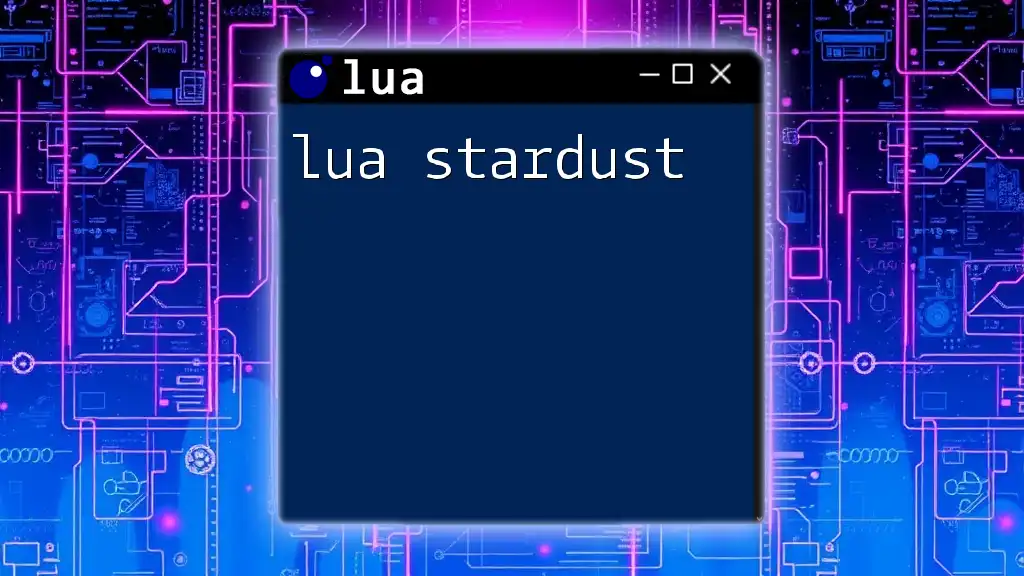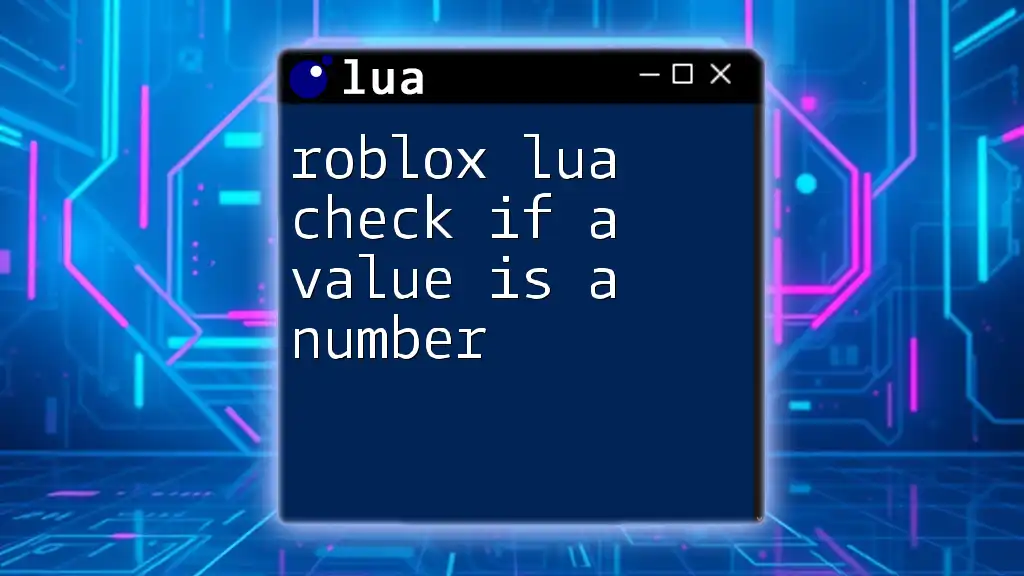"Lua Stardust is a Lua library that simplifies the creation of interactive animations and visual effects in games and applications."
Here's a simple example of using the Lua Stardust library to create a particle emitter:
local ParticleEmitter = require("stardust.ParticleEmitter")
local emitter = ParticleEmitter.new()
emitter:setPosition(100, 100)
emitter:setParticleLifetime(2, 5)
emitter:setParticleSpeed(50, 100)
function love.update(dt)
emitter:update(dt)
end
function love.draw()
emitter:draw()
end
What is Lua Stardust?
Lua Stardust is an innovative framework that makes working with the Lua programming language easier and more efficient. It serves a variety of applications, from game development to scripting automation, unlocking new potential for developers looking to harness the power of Lua in a streamlined manner. Stardust leverages Lua's core capabilities while adding unique features tailored to modern programming challenges.
Lua Language Overview
History and Evolution
Lua was first developed in 1993 in Brazil, originally intended for use as a powerful scripting language that could be embedded into applications. Over time, it has gained significant traction thanks to its lightweight nature and flexibility.
Key Features of Lua
- Lightweight and Embeddable: Lua's design philosophy emphasizes minimalism, which allows it to run efficiently even on resource-constrained devices. This makes it a popular choice for embedded systems and game engines.
- Extensible and Flexible Syntax: The syntax is straightforward, allowing developers to use it without excessive boilerplate code. Its extensibility means that developers can create custom libraries and functions to enhance its functionality.
Getting Started with Lua Stardust
Prerequisites
Before diving into Lua Stardust, ensure you have the necessary software and tools installed. You will need basic knowledge of programming concepts, an operational version of Lua itself, and an IDE that supports Lua.
Step-by-Step Installation
- Downloading Lua Stardust: Access the official Lua Stardust website and download the latest version compatible with your operating system.
- Installing Lua Stardust: Follow the specific instructions provided for your OS, which typically include:
wget https://example.com/lua-stardust.tar.gz tar -xf lua-stardust.tar.gz
Configuring Your Environment
Setting up your development environment is crucial for a seamless coding experience. You can utilize IDEs like ZeroBrane Studio, which is highly compatible with Lua. Make sure to configure your IDE settings to recognize the Lua Stardust libraries, allowing you to start coding right away.
Core Concepts of Lua Stardust
Main Features of Lua Stardust
Light and Fast Execution
Lua Stardust optimizes execution speed dramatically when compared to many other languages. This efficiency is particularly beneficial in environments that require high-performance processes, such as in gaming.
Extensibility and Custom Functions
One of the greatest strengths of Stardust is its capacity for customization. As a developer, you can create custom functions that integrate seamlessly with Lua's existing syntax. For instance, you can define a custom function to calculate the area of a circle:
function areaOfCircle(radius)
return math.pi * radius^2
end
print(areaOfCircle(5))
Key Components of Stardust
Variables and Data Types
Lua Stardust supports various data types, including strings, numbers, tables, and functions. Understanding how to declare and manipulate these types is fundamental before progressing further.
Control Structures
Utilizing loops and conditionals is essential in programming. Lua Stardust provides straightforward constructs for these, such as:
for i = 1, 10 do
print("Number: " .. i)
end
Working with Lua Stardust: Practical Examples
Basic Commands in Lua Stardust
Printing Hello World
The classic "Hello, World!" program is an excellent starting point. It introduces syntax for output:
print("Hello, Stardust!")
Creating Variables
Variable declaration is simple, and it’s important to practice this foundational skill:
local name = "Stardust"
print(name)
String Manipulation
Stardust simplifies string manipulations with built-in functions. For example, string concatenation can be done effortlessly:
local greeting = "Welcome to " .. name
print(greeting)
Advanced Lua Stardust Programming
Tables in Lua Stardust
Tables are powerful data structures in Lua, serving as arrays, dictionaries, and more. You can create and manipulate tables seamlessly. An example of creating a table representing a star might look like this:
local star = {
name = "Alpha",
type = "Giant"
}
print(star.name) -- Outputs: Alpha
Functions and Metatables
Defining functions in Lua Stardust is straightforward. Metatables offer advanced capabilities that allow developers to override default behaviors of tables, enhancing the programming paradigm significantly.
Common Use Cases for Lua Stardust
Game Development
One of the primary applications of Lua Stardust is within the domain of game development. Its lightweight execution model makes it an attractive choice for game engines, where resource management is critical. You might create simple game logic by structuring your code around events:
function onPlayerSpawn()
print("Player has entered the game.")
end
Scripting and Automation
Lua Stardust excels in scripting and automation tasks. For instance, you can write scripts to manage repetitive tasks such as file handling or data management with ease. Here is a simple example of a script that reads a file:
local file = io.open("data.txt", "r")
local content = file:read("*all")
print(content)
file:close()
Debugging and Error Handling
Common Errors in Lua Stardust
Errors are a part of programming, and recognizing frequent mistakes will empower you as a developer. Syntax errors and nil references are common and can generally be resolved with careful debugging.
Best Practices for Error Handling
To write cleaner, safer code, implement error handling mechanisms such as `pcall`, which allows you to catch errors without crashing the program:
local success, err = pcall(function()
error("This is an error!")
end)
if not success then
print("Caught an error: " .. err)
end
Conclusion
In summary, Lua Stardust combines the power of Lua's simplicity with cutting-edge features that enhance the programming experience. From installation to advanced practices, it provides a rich environment conducive to both new and experienced developers. By leveraging Lua Stardust, you can build efficient applications and automate tasks effortlessly, setting the stage for a successful programming journey.
Additional Resources
To further explore Lua and Lua Stardust, consider engaging with dedicated communities or diving into comprehensive literature. Websites, forums, and online courses can provide additional insights and support as you continue your development journey.
Frequently Asked Questions about Lua Stardust
In this section, address common queries and misconceptions about Lua Stardust. This can include topics like installation troubles, common bugs, or best practices that optimize performance. Engaging with these frequently asked questions will clarify doubts and bolster your learning experience.








